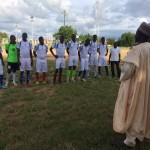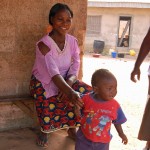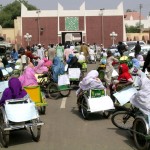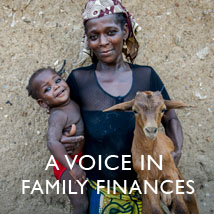
The Peace Through Sports project, led by the American University of Nigeria with support from USAID’s Office of Transition Initiatives, has been hosting a six-month sports tournament to recognize and build youth self-esteem, resilience and tolerance. Youth participants, diverse in geographic origin, attend local secondary schools or were identified as vulnerable to violent extremism. Over 1,500 local youth from the northeastern state of Adamawa have been competing on 104 soccer, basketball and volleyball teams.

In Nigeria, the most populous country in Africa, fewer than one out of every five married women use family planning. An additional 16 percent of women want to delay or limit childbearing, but are not using contraception. Limited access to family planning prevents women from safely spacing their pregnancies, fuels unsustainable population growth, and puts the health of women and children at risk.
In Niger, it is common for girls to get married as young as 14 years old and miss out on the opportunity to attend school and learn essential life skills. They grow up lacking knowledge of proper health, nutrition and pregnancy practices, leading to high rates of chronic malnutrition and related pregnancy complications affecting them and their future offspring.

A new civic education film from the Youngstars Foundation asks Nigerians the question, “Aftercount, I Vote Wetin?” (“I Voted, Now What?”). The film, released in 2012, encourages Nigerian youth to stay involved in the political process between elections.

Amina Abdullahi is just one of thousands in Nigeria who have contracted polio, an infectious, viral disease that invades the nervous system and can cause paralysis. Many of those who have contracted polio face discrimination in Nigeria and find it difficult to lead a normal life. For Abdullahi, the situation worsened when her father died and she became the sole provider for her family. Although trained as a tailor, she could not find employers who would let her practice in their shop. Abdullahi learned of the Kano Polio Victims Trust Association, an organization set up to provide financial and technical support, including vocational training, for its members so they can engage in cottage industries to support their families. Learning of the situation, USAID provided the association with new equipment, including 10 sewing machines, five knitting machines and two specialized embroidery machines. The news spread fast among association members, and Abdullahi and most of the other trainees returned to the center, along with 23 new members in the tailoring classes.









Comment
Make a general inquiry or suggest an improvement.